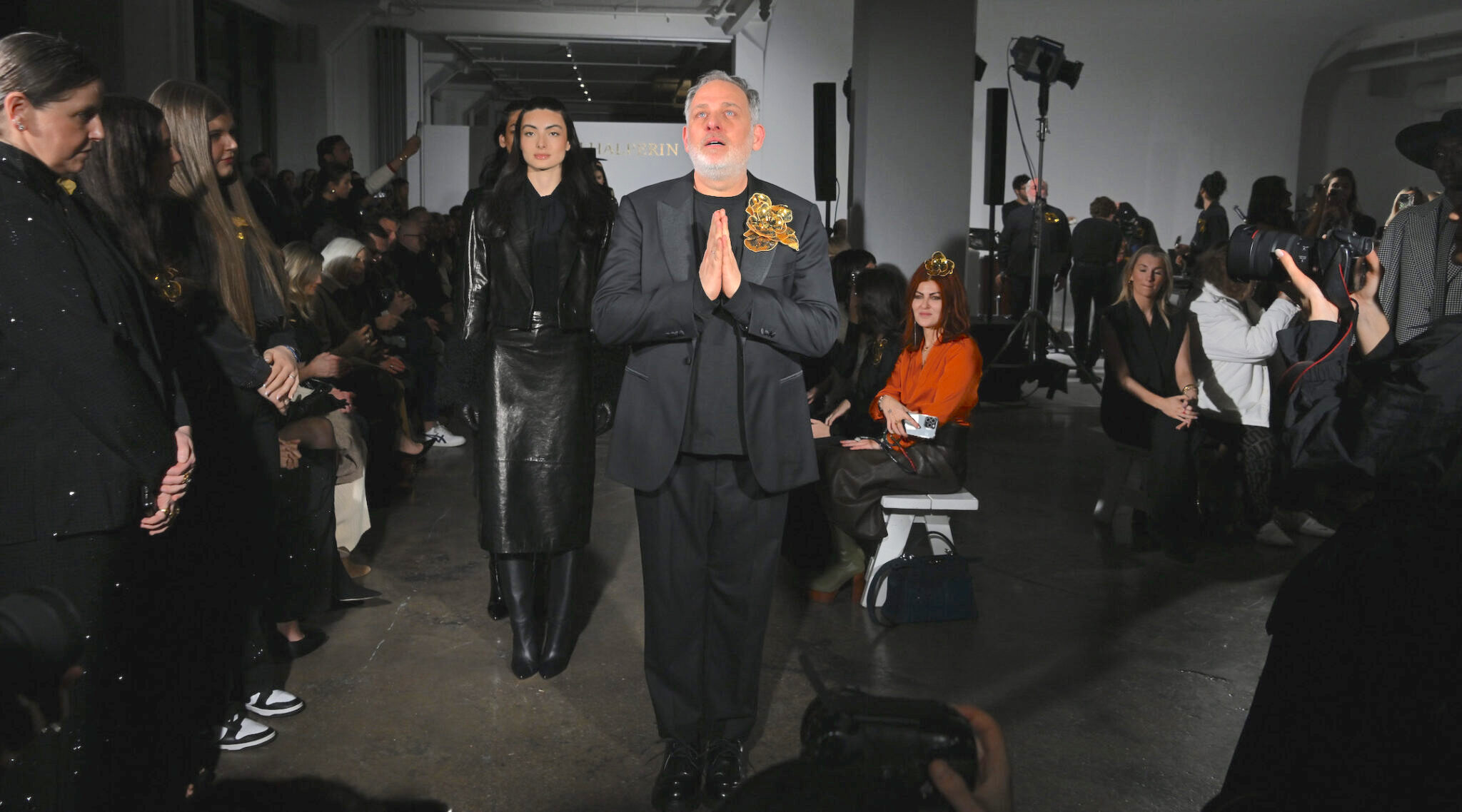(New York Jewish Week) — For his very first runway show under his own label for New York Fashion Week, Israeli-American designer Kobi Halperin knew exactly the message he wanted to send: hope.
On Sunday, Halperin concluded his show at Soho’s Splashlight Studios for his Fall 2024 collection, titled “Illumination of Hope,” with an instrumental version of “Hatikvah,” Israel’s national anthem, which translates to “The Hope.”
“To me, it just felt right,” Halperin, 51, told the New York Jewish Week. “I wanted it — it was my moment and I wanted to use it to make people feel good about who we are [as Israelis].”
“I felt like it was necessary,” he added about his show’s moving finale, which has been viewed more than 160,000 times on the Jews of NY Instagram account. “I am so overwhelmed that it has made so many people cry and so many people actually feel good about themselves. That’s more important than anything else — it’s more important than the statement of the fashion.”
Halperin’s entire ready-to-wear collection, which features more than 50 looks primarily in cream, black and metallic gold and silver, was inspired by his childhood memories of Shabbat, he told the New York Jewish Week.
The white outfits, which opened the show, were influenced by the concept of the Shabbat bride, as well as Shabbat candles, which for Halperin signify both sadness and also hope.
“Lighting the candle is the clear moment of the beginning of Shabbat. The wax dripping symbolizes sadness and the memories of the people that are not with us any more,” Halperin said. “But candles are also the light at the end of the tunnels and are optimistic and hopeful.”
In addition to the actual clothes, the models walked to traditional prayers sung on Shabbat, such as “Eshet Chayil” and “Lecha Dodi.” The musical arrangements, played by a live band, were composed by Israeli music producer Joseph E-Shine Mizrachi.
“The whole collection was basically inspired from my heritage,” said Halperin, who grew up in Netanya, Israel, and now lives in New York. “I was raised in a religious family and if there’s something that I miss, it’s the idea of Shabbat. It’s not necessarily the religious part, I love the idea that there’s an ending, but then a beginning of something else. For me, I remember this amazing moment in Israel on Fridays: Everything is shutting down, the stores are closed, the music changes, the sky is changing.”
Halperin moved to New York City 25 years ago upon graduating from Israel’s Shenkar College of Engineering and Design. After working for fellow Israeli designer Elie Tahari as well as Kenneth Cole, Halperin launched his own line, Kobi Halperin, in 2015. He also works as the creative director for the French brand Emanuel Ungaro.
“Illumination of Hope” marks Halperin’s first runway show under his own label. The line had its first fashion presentation — a less formal, more intimate way to showcase the clothing — at New York Fashion Week last fall.
“I felt completely exposed in a way and it felt good. I really put my heart and soul on the runway with the concept and the clothes and the fashion,” Halperin said. “I felt very lucky and very humble that I was able to bring everything from inside me and share it with everybody.”
Halperin describes his clothes — especially this Shabbat-inspired line — as modest, inspired by his religious background, but also as an aesthetic choice. “It’s refreshing. We’re seeing so many vulgar things all around us that suddenly looking at a woman with so much respect — an eshet chayil [woman of valor] — and making her look beautiful and, more importantly, feel beautiful, is what I’m trying to do,” he said.
The label, which is available at upscale department stores such as Bloomingdales and Saks Fifth Avenue, “embodies a European sensibility and is recognized by its crafted artisan details and modern femininity,” according to its website.
For Halperin, who was visibly emotional as his show on Sunday concluded, creating this moment of hope on the runway was a way for the designer to contribute something positive during the war in Israel, which began with a crushing attack by Hamas on Oct. 7 that left 1,200 people dead and about 250 people hostages, including 134 who remain in Gaza.
“It’s hard for me to justify fashion with everything that’s happening around us right now,” he said. “That’s why I love the idea of taking this opportunity to gather and be together — to find what we have in common and respect that we think differently about specific things, but still recognize that as people we actually can have hope and pray for something positive.”
The New York Jewish Week brings you the stories behind the headlines, keeping you connected to Jewish life in New York. Help sustain the reporting you trust by donating today.





